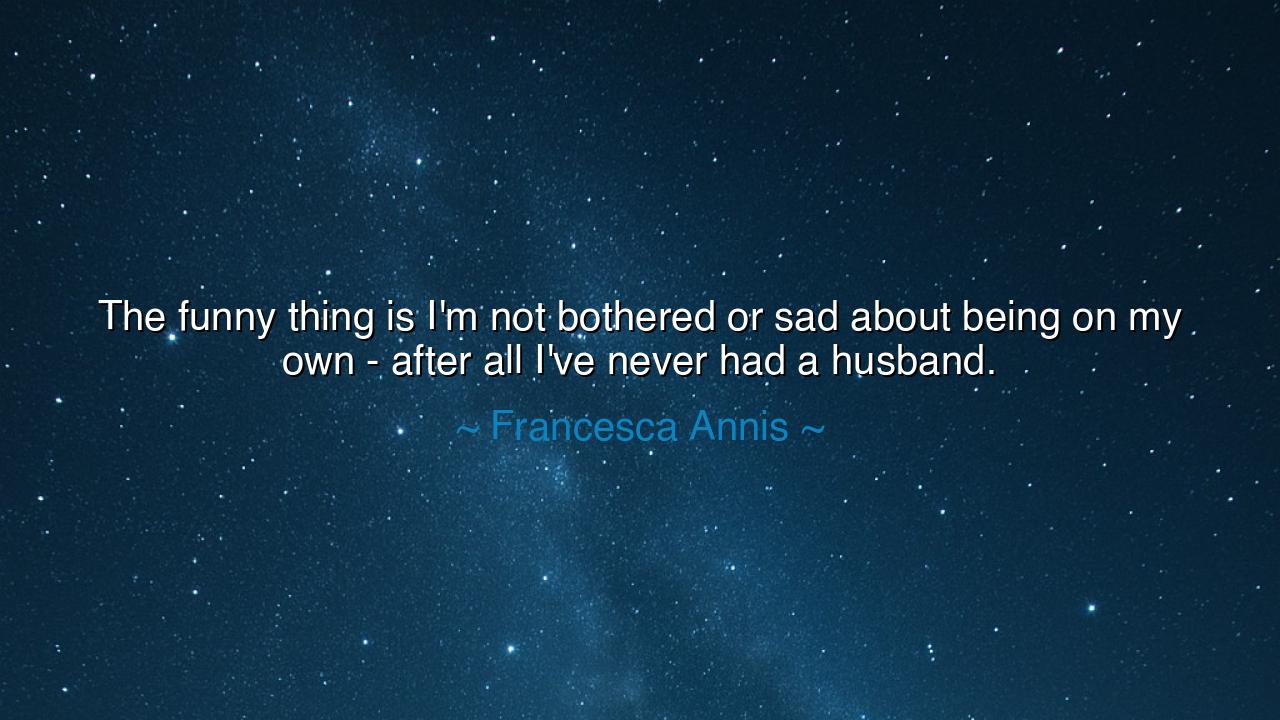
The funny thing is I'm not bothered or sad about being on my own
The funny thing is I'm not bothered or sad about being on my own - after all I've never had a husband.






The words of Francesca Annis, “The funny thing is I’m not bothered or sad about being on my own – after all, I’ve never had a husband,” are spoken with the calm strength of a woman who has made peace with solitude. Beneath their gentle humor lies a profound truth about self-sufficiency, contentment, and the quiet dignity of a life lived on one’s own terms. Her words defy the notion, deeply rooted in many cultures, that a woman’s fulfillment must come from attachment—that her happiness must be defined by the presence of another. Annis’s tone is not defiant, but serene. She reminds us that to be alone is not to be lonely; it is to stand whole within oneself, unbroken and unashamed.
In the ancient world, the philosophers often spoke of solitude as a sacred condition. Aristotle taught that man is by nature a social being, yet even he acknowledged that the highest form of wisdom comes to those who can dwell alone with their thoughts. Annis’s statement echoes that same ancient understanding, but from a woman’s heart. She has found a balance between independence and acceptance, a life in which solitude is not exile but freedom. When she says she is “not sad,” she does not mean that she feels nothing; she means that she has learned to draw joy not from companionship, but from the depth of her own spirit.
This quote also reveals the gentle irony of modern womanhood—the idea that one must explain or justify contentment without marriage. For centuries, women were told that life’s purpose was to marry, to bear, to serve. To remain single was once seen as a failure of destiny. Yet Francesca Annis turns this idea upon its head with quiet grace. Her “funny thing” is not sarcasm, but enlightenment: the realization that she cannot mourn something she has never needed to complete her being. She is a mirror to all who fear solitude, teaching that self-love is not arrogance, but liberation.
Consider the example of Queen Elizabeth I of England, often called the “Virgin Queen.” Surrounded by suitors, she chose none, declaring herself “married to her kingdom.” Her reign became one of the most glorious in English history, and her solitude was her strength. Like Annis, Elizabeth understood that power and peace come not from possession but from self-command. The world called her alone, but she ruled an empire from the throne of her own mind. Her story, like Annis’s words, reminds us that solitude, when embraced with purpose, becomes sovereignty.
To be “on one’s own” in this sense is not isolation—it is mastery of the self. The person who can dwell peacefully within their own company has conquered one of life’s greatest fears. Most men and women seek distractions to avoid their own reflection; few have the courage to sit with silence and find beauty there. Annis’s declaration is, therefore, a quiet act of heroism. It reveals a heart that has made peace with time, that has found meaning not in the echo of another’s voice but in the music of her own thoughts.
There is, too, a subtle lesson in her humor. By calling her solitude “funny,” Annis shows that wisdom carries laughter within it. She is not bitter, nor defensive, nor sorrowful. She has reached that rare serenity that allows a soul to smile at its own story, to see life not as a lack, but as a continuous unfolding of choice. Such laughter is not light—it is divine, for it springs from understanding. The ancient Stoics would have recognized in her tone the mark of one who has mastered fortune’s whims.
Let this teaching, then, be preserved: Do not measure the worth of your life by the closeness of another, but by the wholeness within yourself. Whether you walk beside a partner or walk alone, the journey is yours to claim. To be content in solitude is to have discovered the secret harmony between spirit and world. Francesca Annis’s words remind us that solitude is not a void, but a vessel—it holds peace, reflection, and strength for those who dare to fill it. And when one can smile, as she does, and say with lightness, “I am not sad to be on my own,” then that person has touched the eternal truth: that happiness begins not in love received, but in love understood.






AAdministratorAdministrator
Welcome, honored guests. Please leave a comment, we will respond soon